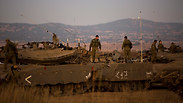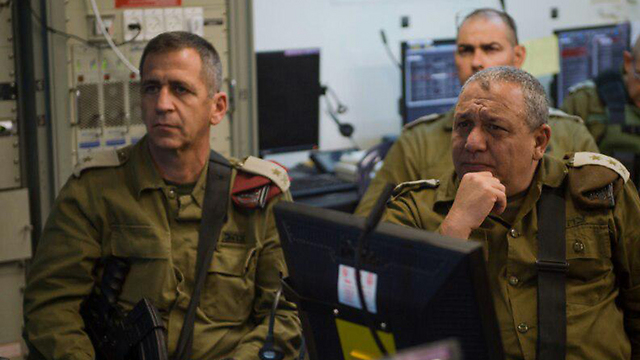
IDF soldiers in Golan Heights (Archive photo)
צילום: EPA
Conversation by fire
Analysis: Syria's rockets into Israel and Israel's response are really a conversation that conveys messages through fire rather than words.
The shells fired at the Golan Heights—including those of Tuesday—were not launched under orders from the Syrian regime. However, the launch of two surface-to-air missiles on Monday at Israeli Air Force planes was probably ordered by Assad. From the Syrians' point of view, it was a cautious step that didn't intend to damage the planes, but rather to convey the message: Support me—because gone are the days when the Syrian army would restrain itself when it comes to Israeli assistance to the rebels in the Golan.
At the beginning of the week, something happened in Syria. President Assad got a dual-powered flak jacket: Russian and American. Not only did he get the support of the two powers that would guarantee the continuation of his reign, but he also became the central axis in maintaining the ceasefire and the architecture of Syria on the day following the civil war. His self-confidence allows him to resume production of chemical weapons, to rebuild long-range missiles and rockets and renew his sophisticated military industry.
He knows that the American government will swallow everything, and as for the Russians—who support this renewal in production—nobody dares to mess with them. It's no wonder that Assad felt safe enough to realize his threat from the past to settle accounts with Israel regarding the aid that it gave to the rebels in the Golan Heights.
The minister of defense and the prime minister have found themselves at a crossroads. They have to order a military response to the ongoing Syrian provocation. Otherwise, Israel will be seen in the area as weak in the area, and they will be thus internally. The public is already accustomed to this Pavlovian response. Former Defense Minister Moshe Ya'alon set the pattern of action: There will be no restraint when Israel's sovereignty is damaged. Any fire on Israeli territory, including accidental fire, will meet with a response. Minister Lieberman adopted this policy of sending messages through firing. This policy works like a reflex, while taking calculated risks, up to the beginning of the week.
Now Israel is faced with a dilemma: Should it respond harshly against targets that would be painful to the government or significant military targets deep in Syria, or to attack on the Golan border the firing cells. The temptation to put Assad in his place is huge, but in view of the relative quiet in Syria, Israel would appear to be a warmonger. A big military operation would force Assad to escalate in response, and from there the discussion of messages by fire would only deteriorate. There's no doubt that both the Russians and the Americans are trying to lower the temperatures on both sides.
Above every decision taken today in the State of Israel in light of the tensions on the Golan border, the famous statement of the late Ariel Sharon is hovering. After the terrorist attack at the Dolphinarium, he said, "Even restraint is strength." The State of Israel is strong enough to cause the Syrian regime irreversible damage inside of a few hours. So it can allow itself to hold a conversation by fire with the Syrian army in the Golan in a measured manner.











